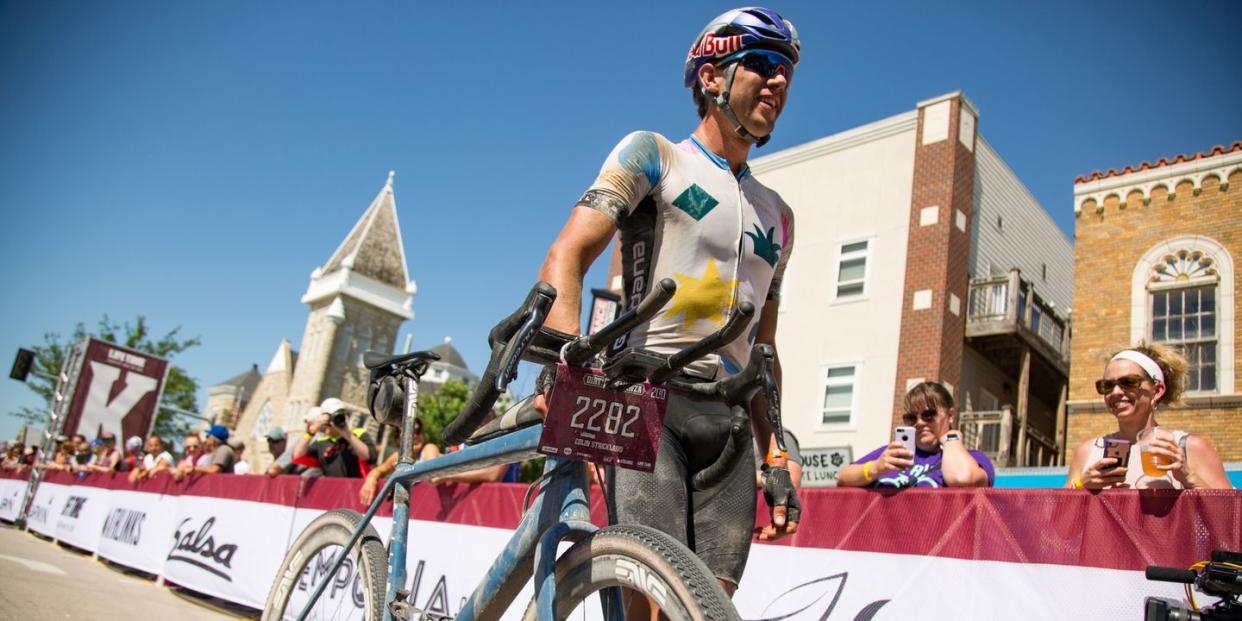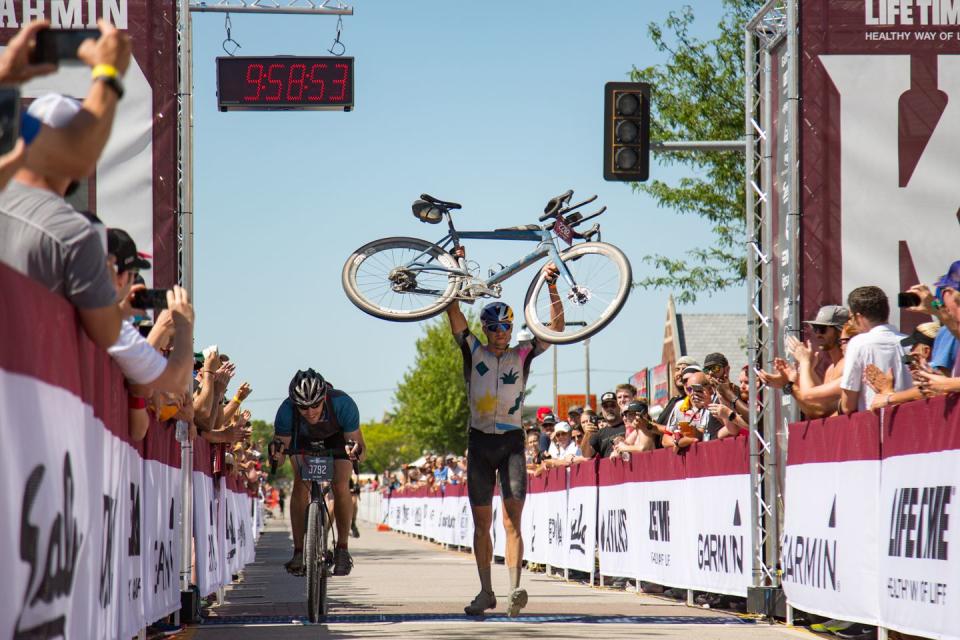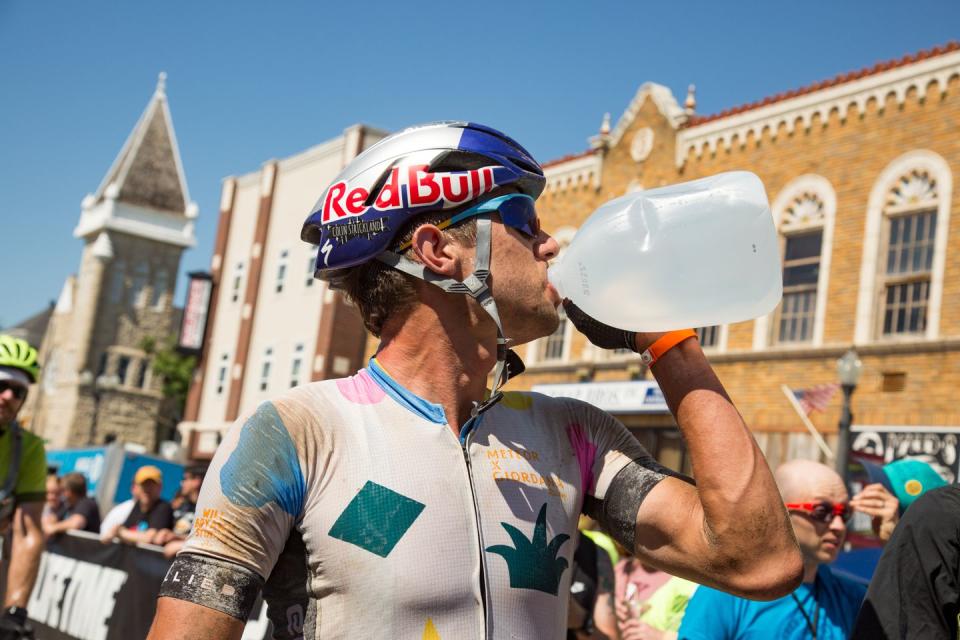Meet the Racer Who Won Dirty Kanza 200 in Less Than 10 Hours

Colin Strickland won Dirty Kanza 200 last weekend, becoming the first rider to finish the race in less than 10 hours.
The 32-year-old, who specializes in both criteriums and gravel events, bested a field loaded with current and former WorldTour pros.
Here, Strickland talks about his strategy for racing, why he likes to train solo, and recovering from a pelvic fracture in the fall.
Colin Strickland’s record-breaking Dirty Kanza win last weekend might appear to have been helped by anonymity. When Strickland launched his bold mid-race attack, none of the top pre-race favorites-all current or former WorldTour pros-reacted, perhaps figuring there was no way this unfamiliar rider could make it stick.
But Strickland nailed it, becoming the first racer in Dirty Kanza history to complete the 200-mile event in under 10 hours. He won by more than 9 minutes over second-place finisher Peter Stetina, while EF Education First teammates Alex Howes and Lachlan Morton came a further 10 minutes behind in third and fourth, respectively. Reigning champion Ted King ended up eighth, almost 40 minutes behind the winner.
Would things have been different had they not given Strickland the leash to escape in the first place? A look around the finish after the race would indicate no. While Howes, Morton, and Stetina all seemed shell-shocked from the blistering long day, Strickland looked fresh, clearly benefiting from many a hot training ride in and around his home of Austin, Texas.

More importantly, the 6’2”, 170-pound Strickland is built for the high-powered demands of the rolling Dirty Kanza course, where a tailwind propelled riders for most of the last 50 miles. If his racing career had taken a different trajectory, we might be talking about Strickland as a potential Paris-Roubaix or Tour of Flanders contender. But the Meteor X Giordana rider has no interest in the what-if game. He’s simply enjoying his unique ride, which includes multiple Red Hook Crit titles, a Texas State cyclocross championship, and a handful of big-time gravel wins.
We caught up with Strickland, 32, a few days after his Dirty Kanza triumph to learn more about the rider who now heads to Oklahoma’s Tulsa Tough this weekend, where he’ll compete in the Red Bull Last Stand.
Bicycling: Were you surprised to win Dirty Kanza, given how loaded the field was?
Colin Strickland: Honestly, not totally. When [EF Education First] announced their plans to do these alternative races, I said at the time that it was like throwing a wolf pack into a crocodile pond. Sure, they are these cycling super-predators. But the rules are different here. In the case of Dirty Kanza, it was the heat and terrain. I don’t think they were totally ready for the toll it would take on their bodies.
BI: So were you the strongest guy or the most experienced?
Strickland: I have no idea, because I peaced out while all those guys were still holding their cards. If there were a bunch of sustained climbs, they would obviously put time into me because of their superior power-to-weight ratio. But the nature of the course, and the fact that there was a tailwind for the last 50 miles, made it possible for me to hold the gap I’d established. I also think that heat and fueling had a huge effect on those guys. Riding at your limit for over 125 miles on gravel is really hard.
At the same time, I’d never raced against guys of that caliber before. I don’t know if I could have stayed in the group all race, so I made a move that put things on terms I am familiar with. It was mentally more comfortable to be alone versus having my opponents around me. You don’t have to get caught up in the group dynamics. You can go slow when you feel like going slow, and hard when you feel like going hard.
BI: So you spent five hours riding alone. What goes through the mind when you’re out solo for that long?
Strickland: A lot of different emotions. When you’re dragging into a headwind doubt starts to creep in, and you start asking yourself what the hell are you doing out here all alone. But if you’re getting pushed by a tailwind and flying down the road, you start feeling better. I tried to not think about winning and instead just focus on the process of being efficient, getting my fueling right, choosing the right lines. One of the things I love so much about gravel racing is that there is always a best line, that one centimeter stripe down the road that is a little faster than anywhere else. I’m always trying to find that line, and that helps keep the mind occupied.

BI: You train alone a lot. Why is that?
Strickland: Some of it is simple scheduling. Most of my riding buddies have real jobs and can’t ride their bike all day. And the kind of training rides I do don’t really make sense if you’re not trying to race these types of events. It’s also mentally helpful. A lot of people don’t have that mindset to continue to push themselves mile after mile for no apparent reason.
BI: You fractured your pelvis last September. What happened, and what was the recovery process?
Strickland: I was on my mountain bike in a parking lot heading toward a trailhead, and was just messing around and ended up falling funny. It was the perfect side shot, where there is no protective muscle mass, and I fractured the acetabular. I was in a wheelchair for a week and I couldn’t walk or put any pressure on it for two months. It would take me 20 minutes just to scoot to the edge of the bed to take a piss. But fortunately it was a simple fracture that didn’t displace, so I’m all good now.
BI: You’ve made a name for yourself as both a gravel and fixed gear criterium racer. Do you have a preference?
Strickland: I prefer long-distance gravel races because I think I’m better at them. With endurance events there’s more chance to take advantage of genetics, how much your ancestors hunted and gathered versus farmed. I think my ancestors did a lot of hunting and gathering, and that helps me ride bikes really long distances.
BI: So why continue to race criteriums and not specialize more?
Strickland: If I’m doing this full time and treating it as a job, part of that is to get exposure for the people who support you. In the U.S. criteriums get a lot of exposure. That’s good bang for the buck when you’re talking about a 75-minute race. Is it the best marriage with racing long-distance gravel events? Not really. But it’s a job, so I can’t be a princess about it. I have to do races because I’m a bike racer.
BI: You have a fairly scientific approach to racing, and you used to be an environmental scientist. Is there a connection there?
Strickland: Yeah, on some level. For Dirty Kanza I definitely tried to analyze the wind patterns for the day, and knew there would be a headwind and crosswind early and then a tailwind later, and that knowledge played into my overall tactics.
BI: You didn’t start racing bikes until you were 24. Ever wonder what could have been if you’d started earlier? Could you have ended up racing at the top level in Europe?
Strickland: Sure, I’ve wondered just based on physiology and how I respond to training. But it was never a legitimate dream. It’s all so front loaded where you have to be on one of those high-level development teams at 15-16, winning national championships. My parents were organic farmers, not endurance athletes, so that door was never opened for me. And that’s fine. I’m having fun and enjoying the ride. When it stops being fun or lucrative, I’ll move on. But so far I’ve been lucky. The moves I’ve tried have worked. The camera has happened to be on when I’ve had a good result. And sure, maybe the Spring Classics would have suited me, but I’ll never know and that’s okay.
('You Might Also Like',)

